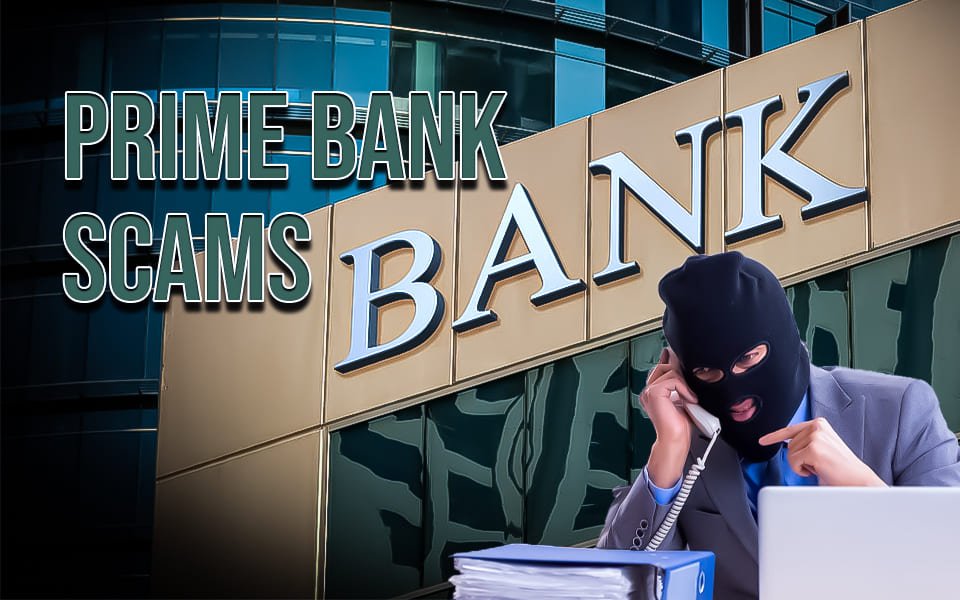


The banking industry is flooded with fake banks and fraudsters seeking opportunities to lure people into fraud and get access to all of their assets and personal details. Prime Bank Scams is one of the branches of these scams.
In prime bank scams, fraudsters target people who desire quick wealth and have limited understanding of the financial system. Just like many other financial scams, prime bank investment scams are filled with fake promises, false hopes, and so-called once-in-a-lifetime investment opportunities.
Con artists set up a proper prime bank scheme to make investors believe they are legit in the market. They offer opportunities that are too good to be true, and mostly everyone affiliated with them is making good returns from them. Such lies make investors get trapped in these scams later, when they realize it’s too late. Let’s dive deeper to learn more about the scam.
Prime banks are the ones that offer investment schemes or special schemes that are only available to banks or other financial institutions. They usually target investors with good net worth, and they are informed that the investment is secret but can yield high returns.
Speaking about the returns, in prime bank schemes, fraudsters claim that they can earn high returns in a short period of time with little to zero risk, and investors who desire quick wealth in a short time are easily enticed by such scams.
Since the 1990s, prime banks have been quite popular, but now they have spread widely on social media, and they are advertising intensely on social media to lure more people and make them invest in their scam.
Prime banks are nothing more than a ponzi scheme or advance fee scam. They work the same way, but there are very few chances where investors do get any return. In fact, they are made to believe that they can get guaranteed high returns on a monthly basis, but in turn, they receive nothing.
Prime Bank is not a legitimate financial institution, but they claim to be a proper financial intuition or company, and they try to entice people to get into their scam. As mentioned above, these fraudulent companies lure investors into their scams, and most of these fraudulent companies provide returns to the old investors, which they get from the new investors.
They work similarly, like a Ponzi scheme or advance scheme, where institutions lure investors and take their money or provide returns by fueling the same funds received from new investors.
Prime Bank’s schemes are not that tough to spot in the investment market, but it gets tough when we have to verify whether they are real or fake. They will present false documents and more such things to prove their legitimacy. I’ll list some of the false claims made by the prime bank fraudster.
Many investors fall for the scam, even if they spot some red flags that raise their suspicions about the investment scheme. But sometimes a few luring offers can cost you a fortune. I’ll list a few of the most common red flags you can spot in prime bank investment schemes or any other scheme in the investment industry.
Lack of information is one of the biggest red flags in any scam. The fraudster will try their best to manipulate things and keep things complex to understand, so the investor has no interest in digging deep into the details of the investment.
You should get all the verifiable information and ask more questions about the investors to see if there are any potential red flags; don’t get involved in that investment option. The fraudulent investment options try to present false perks of the investment, distract the investors, and get the investment anyway.
Technical Complexity is one of the defenses against investors who ask more about the investment scheme. They try to keep things more complex so the average investor cannot understand them easily and avoid getting into such technical complexity.
If you encounter such people who introduce you to too good to be true investment options and, when you ask for more details about the investment, they state it as too technical and complex to understand, you can take the advice of a professional advisor or attorney who can guide you through investments.
High guaranteed returns are one of the most common red flags you will get from any investment scam. Most fraudsters use these tactics to lure more investors into their schemes and try to get as much money as possible from the investors.
As the fraudsters claim a high return in a short period of time with little to no risk, there are high chances of investors heavily investing in their schemes. It may sound like an easy trick to fall for, but in reality, there are higher chances of people falling for this specific scheme. So beware of such schemes, and if your broker or firm is offering such an investment opportunity, try to get more details about it or avoid such greedy options because there are no investment schemes with little to no risks.
Concluding the article, Prime Bank is a serious threat, mostly for investors with an impressive net worth. As fraudsters usually target such people, if the investor is greedy and desires more wealth in a short period of time, they are the prime target of the fraudsters. If you spot any such scam, you can either directly report it to law enforcement or take help from firms like Zecoup to retrieve your funds.
Yes! Banks have the responsibility to refund the fraudulent funds to their customers. The process may take time, but if you are defrauded by prime bank scheme scams, then banks are not responsible as you have willingly invested in some fraudulent firms, which claim to be financial institutes but are not registered anywhere.
Yes! They start their investigations with transaction data and look for any suspicious payments. They also check the time of the transaction being processed and the location, apart from the IP address, which is also included in the investigation.
Scammers can get your personal details from various means, including phishing, SMS, email, malware, or a MITM attack through public wifi.
